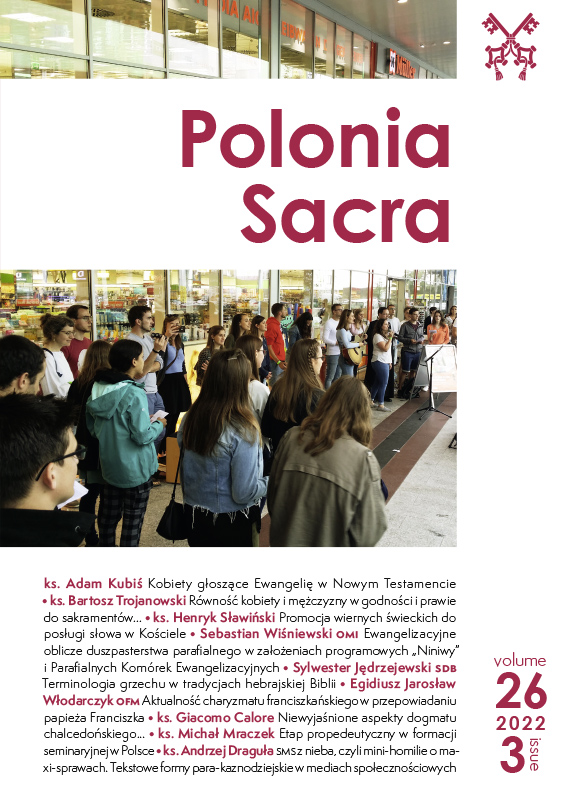Equality of Women and Men in Dignity and the Right to the Sacraments, with Particular Emphasis on Holy Orders and Marriage
DOI:
https://doi.org/10.15633/ps.26302Keywords:
woman, man, equality, dignity, marriage, ordinationAbstract
The fundamental right of the faithful to the sacrament comes from God’s law. It is a guarantee of the possibility of achieving the spiritual goods that are necessary for salvation. Only the law of God contained in the essence of the sacraments themselves can limit this law. Among the general conditions that must be met in order to exercise the right to the sacrament are those mentioned in can. 843 Corpus Iuris Canonici. The universal legislator cares for the equal treatment of all the faithful on the basis
of their dignity. From this dignity comes the equality of men and women also in accessing the sacraments. This is true of all seven sacraments. In the case of Baptism, Confirmation, Eucharist, Penance and Reconciliation, and the Anointing of the Sick,
the Legislator does not introduce any gender differences or even mention them. The biggest discussions on the issue of equality arise from the possibility of receiving the sacrament of Holy Orders only for men. However, it must be said that the Church is
free to choose candidates for ordination. Therefore, it must be said that men also do not have this right. For this reason, men and women are also equal in law in this matter. In the case of the sacrament of matrimony, woman and man are equal in law and
duties (cf. can. 1055 of the Code of Canon Law). It could be said that a woman is in a sense privileged in the Latin Church as regards the obstacle to abduction. However, the intention of the legislator is to ensure that everyone has the right to free choice of
their spouse. That is why all normative decisions, both canonical and liturgical, aim to emphasize this equality of woman and man.
References
Blanco M., can. 850, w: Exegetical commentary on the Code of canon law, vol. 3.1, Chicago 2004, s. 432–433.
Cenalmor D., can. 213, w: Exegetical commentary on the Code of canon law, vol. 2, Montréal–Chicago 2004, s. 76–83.
Codex Iuris Canonici: Pii X Pontificis Maximi iussu digestus Benedicti Papae XV auctoritate promulgatus, 27.05.1917, oprac. P. Gasparri, Romae 1917.
Kodeks prawa kanonicznego, Poznań 1984.
Kodeks kanonów Kościołów wschodnich, Lublin 2022.
Delpini F., Indissolubilità matrimoniale e divorzio dal I al XII secolo, Milano 1979.
Fornés J., can. 208, w: Exegetical commentary on the Code of canon law, vol. 2, Montréal–Chicago 2004, s. 41–46.
Gajda P., Prawo małżeńskie Kościoła katolickiego, Tarnów 2016.
Ghirlanda G., Il diritto nella Chiesa mistero di comunione, Roma 2014, s. 54–55.
Góralski W., Kościelne prawo małżeńskie, Warszawa 2006.
Hervada J., Le radici sacramentali del diritto canonico, „Ius Ecclesiae” 17 (2005) No. 3, s. 629–658.
Jakubiak T., Problem ważności przyjęcia sakramentu święceń w prawie Kościoła katolickiego, Płock 2020.
Jan Paweł II, Christifideles laici.
Jan Paweł II, Mulieris dignitatem.
Jan Paweł II, List apostolski Ordinatio sacerdotalis, 22.05.1994, „Acta Apostolicae Sedis” 86 (1994), s. 545–548, za: „L’Osservatore Romano” wyd. pol. 8 (1994), s. 7–9.
Kodeks prawa kanonicznego. Komentarz, red. P. Majer, Kraków 2011.
New commentary on the Code of Canon Law, eds. J. Beal, J. Coriden, T. Green, New York [cop. 2000].
Obrzędy chrześcijańskiego wtajemniczenia dorosłych. Dostosowane do zwyczajów diecezji polskich, Katowice 2016.
Obrzędy sakramentu małżeństwa dostosowane do zwyczajów diecezji polskich, Katowice 2009.
Pighin B., Diritto sacramentale canonico, Venezia 2016.
Pinto P., Commento al. Codice dei Canoni delle Chiese Orientali, Città del Vaticano 2001.
Pinto P., Commento al. Codice di Diritto Canonico, Roma 1985.
Codice di Diritto Canonico Commentato, a cura della Redazione di „Quaderni di diritto ecclesiale”, Milano 2009.
Rincón-Pérez T., La liturgia e i sacramenti nel diritto della Chiesa, Roma 2014.
Sabbarese L., Il matrimonio canonico nell’ordine della natura e della grazia, Roma 2019.
Sobór Trydencki, Kanony o reformie małżeństwa, I/C 1–10, w: Dokumenty Soborów Powszechnych, t. 4, układ i oprac. A. Baron, H. Pietras, Kraków 2005, s. 721–733 (Źródła Myśli Teologicznej, 33).
Sobór Watykański II, Lumen gentium.
Sobór Watykański II, Gaudium et spes.
Święta Kongregacja Nauki Wiary, Deklaracja Inter insigniores, 15.10.1976, „Acta Apostolicae Sedis” 69 (1977), s. 98–116, https://www.vatican.va/roman_curia/congregations/cfaith/documents/rc_con_cfaith_doc_19761015_inter-insigniores_pl.html (13.09.2021).
Święta Kongregacja Nauki Wiary, Odpowiedź na wątpliwości dotyczące doktryny zawartej w liście apostolskim Ordinatio sacerdotalis, 28.10.1995, „Acta Apostol-icae Sedis” 87 (1995), s. 1114, https://www.vatican.va/roman_curia/congregations/cfaith/documents/rc_con_cfaith_doc_19951028_dubium-ordinatio-sac_pl.html (13.10.2021).
Trojanowski B., Prawo do sakramentu święceń, „Ateneum Kapłańskie” 177 (2021) z. 2 (675), s. 326–338.
Vasil C., Separacja, rozwód, rozwiązanie węzła małżeńskiego i powtórne zaślubiny. Stanowiska teologiczne i rozwiązania praktyczne Kościołów prawosławnych, w: Pozostać w prawdzie Chrystusa. Małżeństwo i Komunia w Kościele katolickim, przekł. K. Markiewicz, A. Sikora, M. Wiertlewska, red. R. Dodaro OSA, Poznań 2015, s. 93–124.
Downloads
Published
Issue
Section
License

This work is licensed under a Creative Commons Attribution 4.0 International License.
Authors who publish with this journal agree to the following terms:
- Authors retain the copyright and full publishing rights without restrictions, and grant the journal right of first publication with the work simultaneously licensed under a Creative Commons Attribution 4.0 International License that allows others to share the work with an acknowledgement of the work's authorship and initial publication in this journal.
- Authors are able to enter into separate, additional contractual arrangements for the non-exclusive distribution of the journal's published version of the work (e.g., post it to an institutional repository or publish it in a book), with an acknowledgement of its initial publication in this journal.
- Authors are permitted and encouraged to post their work online (e.g., in institutional repositories or on their website) prior to and during the submission process, as it can lead to productive exchanges, as well as earlier and greater citation of published work (See The Effect of Open Access).

